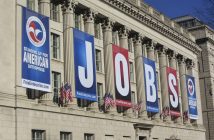Apologists for illegal immigration usually stick to one of two arguments. The first is an argument from a humanitarian perspective. This is the acceptance of a sentiment that illegal aliens come to the United States searching for better opportunities and to escape gangs and violence. Detained aliens tell asylum officers some form of this story daily.
This is a mainstream belief popularized in the media. It is not altogether wrong, although most Central Americans admit that they are fleeing poverty rather than violence. Smugglers tell them to use our broken asylum process as their ticket into the United States.
The argument that is often put forth by business interests is that virtually all immigration is economically beneficial. They argue that America needs cheap immigrant labor because of our strong economy and the lowest unemployment rate since 1969, as though this is a bad thing. This line of thinking advances a belief that GDP growth and corporate profits are more important than the experience of everyday Americans.
Alex Nowrasteh of the Cato Institute argued in a July 2013 blog that it is “hard to see why it’s desirable to increase the wages of low-productivity farm workers.” Then again, the Cato Institute never finds a pro-worker policy it agrees with. After all, this is the same group that advocates for the abolition of child labor laws.
Illegal immigrants are often unskilled and lack education, as are some Americans. According to the Census Bureau, 11 percent of adults between 25 and 64 have no high school degree. Among that same age range, a full 26 percent have only a high school degree. This means that roughly 37 percent of the American working age population has the educational profile of a typical illegal immigrant.
Illegal immigration impacts these workers the most. Unskilled illegal aliens do not drive down wages for lawyers and journalists – they drive down wages for the American workers who can least afford it. Harvard professor and immigration expert George Borjas addressed this in a Politico post:
“Immigrants admitted in the past two decades lacking a high school diploma have increased the size of the low-skilled workforce by roughly 25 percent. As a result, the earnings of this particularly vulnerable group dropped by between $800 and $1,500 each year… immigration redistributes wealth from those who compete with immigrants to those who use immigrants – from the employee to the employer.”
Low unemployment and positive job creation generate a tight labor market. Tight labor markets drive wages upward for existing workers. Despite what Cato might say, this is a good thing. It is good when natural market conditions increase the wages of low-wage workers. The New York Times notes that “the tightest labor market in more than half a century is finally lifting the wages of the least-skilled workers on the bottom rung of the labor force, bucking years of stagnation.”
Wages are not the only thing positively affected by a tight labor market. Previously undesirable job seekers now get the opportunity to enter the labor force. A recent Wall Street Journalfeature examines the positive developments that tight labor markets create. The article describes how a manufacturing firm owner now hires former convicts and recovering alcoholics to staff his warehouses. These are people who we as a society should most want to see succeed. Without regular full-time work many ex-convicts and recovering addicts slip back into their old ways. Hiring these individuals gives them agency to turn their life around.
Law-breaking employers prefer to hire illegal aliens for menial work because they are cheap and unprotected by labor regulations and employee unions. For anyone who cares about civil society, this is an outrage. We should desire to see society’s outcasts brought back into the greater law-abiding community. The best way to achieve this goal is to preserve the tight labor market. It is a better social policy than the “war against poverty” and other government-driven programs.





5 Comments
We definitely do NOT need any more low skilled, uneducated, disingenuous, lazy freeloaders….Congress is already FULL of them!!
Nancy P….You are lecturing everyone about the crisis at the BORDER?!?!….Nancy, You haven’t done anything about the crisis in your HOMETOWN!!…Tent cities, human waste and needles all over. But, maybe ya just don’t care. After all, you’re loaded, and it’s not with ethics. You’re a major hypocrite. Perfect reason for TERM LIMITS!!
Absolutely correct on skilled immigrants. Once every one of the American tech workers let go to hire foreigners in the last 20 years has a job with similar pay and benefits then maybe the discussion can turn to bringing in more H1B workers. Australia makes companies jump through hoops to bring in foreign tech workers. They have to prove, not just say it, the specific steps they took to hire an Australian citizen first.
Nancy Pelosi said today we need “comprehensive immigration reform”. Translation: amnesty amnesty amnesty.
The Worse Mistake Bill Mates Made at Microsoft Was Replacing NW Highschool Graduates With Subpar India H-1Bs
Since H-1Bs we now have virus S/W and patches in our O/S S/W…..when MSFT hired real Americans we had Windows 95 and 98…no virus S/W or weekly patches needed. Today’s H-1B S/W is junk. The actuals don’t lie and we don’t need STEM workers for S/W development, ask Bill Gates, he just has a high school diploma too…they don’t teach source control S/W code in colleges either…its all on the job training intellectual property secrets.
I would argue that the US doesn’t need more “skilled immigration” either. Already, large corporations are to addicted to low-wage skilled immigrants from India, and are forcing Americans to train their replacements as it is. Ask Silicon Valley, and companies like Disney. Not enough attention paid to the phenomenon known as H1-B visas, and it’s impact on “skilled American workers.”